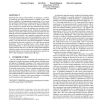Free Online Productivity Tools
i2Speak
i2Symbol
i2OCR
iTex2Img
iWeb2Print
iWeb2Shot
i2Type
iPdf2Split
iPdf2Merge
i2Bopomofo
i2Arabic
i2Style
i2Image
i2PDF
iLatex2Rtf
Sci2ools
ICCAD
2006
IEEE
2006
IEEE
A new statistical max operation for propagating skewness in statistical timing analysis
Statistical static timing analysis (SSTA) is emerging as a solution for predicting the timing characteristics of digital circuits under process variability. For computing the statistical max of two arrival time probability distributions, existing analytical SSTA approaches use the results given by Clark in [8]. These analytical results are exact when the two operand arrival time distributions have jointly Gaussian distributions. Due to the nonlinear max operation, arrival time distributions are typically skewed. Furthermore, nonlinear dependence of gate delays and non-gaussian process parameters also make the arrival time distributions asymmetric. Therefore, for computing the max accurately, a new approach is required that accounts for the inherent skewness in arrival time distributions. In this work, we present analytical solution for computing the statistical max operation.1 First, the skewness in arrival time distribution is modeled by matching its first three moments to a so-call...
Arrival Time Distributions | Hardware | ICCAD 2006 | Skewed Normal Distributions | Time Probability Distributions |
Related Content
| Added | 16 Mar 2010 |
| Updated | 16 Mar 2010 |
| Type | Conference |
| Year | 2006 |
| Where | ICCAD |
| Authors | Kaviraj Chopra, Bo Zhai, David Blaauw, Dennis Sylvester |
Comments (0)

